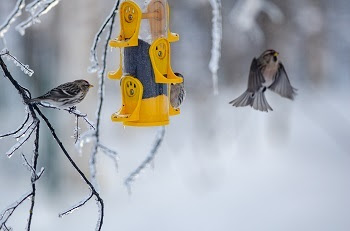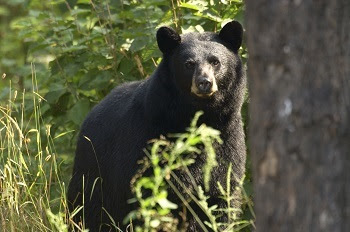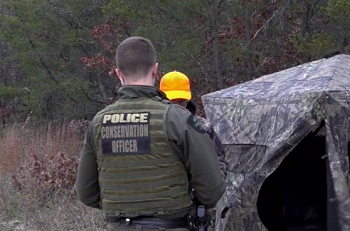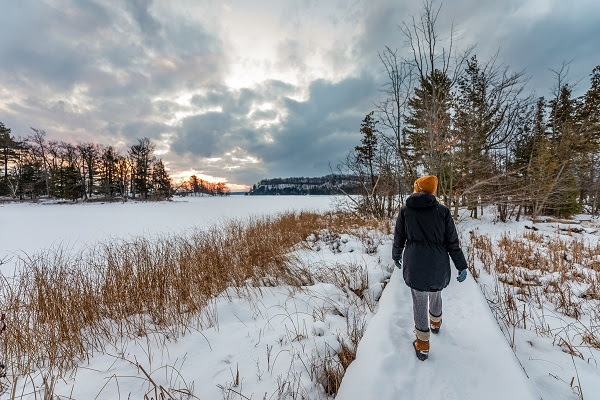| Here are a few of this week’s stories from the Michigan Department of Natural Resources:
See other news releases, Showcasing the DNR stories, photos and other resources at Michigan.gov/DNRPressRoom.
PHOTO FOLDER: Larger, higher-res versions of many of the images used below are available in this folder.
 The newest episode of the DNR Wildlife Division’s “Wildtalk” podcast is now available. February’s show includes a cheeky chat about river otters and a deep dive on the behaviors of crows, one of nature’s most intelligent creatures. The newest episode of the DNR Wildlife Division’s “Wildtalk” podcast is now available. February’s show includes a cheeky chat about river otters and a deep dive on the behaviors of crows, one of nature’s most intelligent creatures.
Scott Eggeman, the Wildlife Division’s field operations manager for the northern Lower Peninsula, talks about habitat work such as a grassland management program and food plot planning. DNR wildlife biologist Pete Kailing stops in with an overview of hunting and trapping opportunities available this month.
Visit the “Wildtalk” webpage for the February episode and show notes and links to past episodes. Questions about the podcast? Email DNR-Wildlife@Michigan.gov. |
 To survive Michigan’s frigid winter temperatures, some birds store food from feeders to eat later in winter, while others expand their food sources and change their diets. To survive Michigan’s frigid winter temperatures, some birds store food from feeders to eat later in winter, while others expand their food sources and change their diets.
Despite these incredible adaptations, winter can still be a stressful time for birds. We can help support winter birds by feeding them when other food sources may be scarce. Here are a couple of tips on how to feed them safely and responsibly in your space:
- Keep your bird feeders and birdbaths fresh and clean throughout winter. Freshen the water every other day, if possible. Clean your feeders once every one to two weeks in a 9:1 solution that is nine parts water and one part bleach, scrubbing away any debris. Dry the feeder before refilling. Clean bird baths with a scrub brush in a 9:1 solution of water and vinegar.
- Don’t place seed directly on the ground or use platform feeders, which tend to attract larger numbers of birds, deer and other unwanted guests. Mess-free birdseed options can help keep the ground clean.
|
These tips are important year-round, but especially now as the highly pathogenic avian influenza virus is still circulating among wild birds in Michigan. While most HPAI cases have been found in waterfowl and scavenging birds (e.g., eagles, hawks and owls), the DNR is continuing surveillance efforts and will test wild birds from die-offs that include six or more birds. You can help by reporting sick or dead birds through the DNR’s Eyes in the Field app.
Learn more about HPAI and what you can do to help limit the spread of this virus at the DNR’s HPAI Frequently Asked Questions webpage.
Visit the Audubon Great Lakes website for tips on attracting common winter birds to your space.
Questions? Contact the DNR’s Julie Melotti at 517-243-1953.
MI Birds is a public outreach and education program presented by Audubon Great Lakes and the Michigan DNR that works to build and bring together wildlife enthusiasts across the state to engage with and conserve Michigan’s public lands for the benefit of birds and people.
 The next meeting of the Michigan Natural Resources Commission – Thursday, Feb. 8, in Lansing – leads off with a Wildlife Committee agenda that includes an analysis of bear population trends and an update on the antler point restrictions survey. The meeting also will cover furbearer regulations, a legislative report and several land transactions. The next meeting of the Michigan Natural Resources Commission – Thursday, Feb. 8, in Lansing – leads off with a Wildlife Committee agenda that includes an analysis of bear population trends and an update on the antler point restrictions survey. The meeting also will cover furbearer regulations, a legislative report and several land transactions.
The day starts at 9:30 a.m. in Rooms M119-121 of Lansing Community College, West Campus, 5708 Cornerstone Drive. See the draft meeting agenda and remaining 2024 meeting dates at Michigan.gov/NRC.
For more information or to request time to speak at the meeting, email NRC@Michigan.gov. |
 It’s almost time for a new episode of “Wardens” – the Outdoor Channel’s weekly show that tells the story of dedicated DNR staff members and the work they do to protect and conserve Michigan’s natural resources. It’s almost time for a new episode of “Wardens” – the Outdoor Channel’s weekly show that tells the story of dedicated DNR staff members and the work they do to protect and conserve Michigan’s natural resources.
This week’s show packs in a lot, including a turkey hunt with the DNR’s acting director and highway patrols that turned up some illegally tagged deer. Check out this sneak-peek video.
To get the Outdoor Channel, ask your local TV service provider or go to outdoorchannel.com, myoutdoortv.com or Amazon Prime Video, or call 855-44-OUTDOOR. More than 78 episodes of “Wardens” have featured Michigan and tallied over 36 million viewers!
Episodes air on the Outdoor Channel every Friday at 9 p.m. Previous episodes air on FOX UP/WLUC-TV6 every Sunday at 9:30 a.m. The show also is available under the title “Wardens of the North” or “Michigan Wardens” on Animal Planet. |
 See more pictures by Michigan state parks photo ambassadors at Instagram.com/MiStateParks. For more on the program, call Stephanie Yancer at 989-274-6182. (This photo is by Aubry Healy, for the Michigan DNR, at Ludington State Park in Mason County.) See more pictures by Michigan state parks photo ambassadors at Instagram.com/MiStateParks. For more on the program, call Stephanie Yancer at 989-274-6182. (This photo is by Aubry Healy, for the Michigan DNR, at Ludington State Park in Mason County.)
|